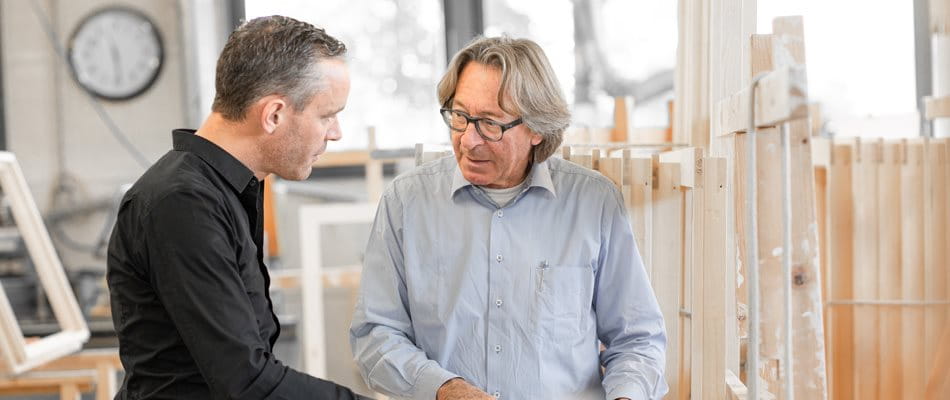
Since 2014, Schmid Fenster Manufaktur AG has been managed by the third generation of the family. However, it was not always certain that Raffael Schmid would manage the company one day. For his father, Sepp Schmid, handing over the reins to his four children was not an issue. It was much more important to him that his daughters and sons chose their own path. He wanted them to learn a profession that they enjoyed. "When the time comes, I'll sell the company," he said to himself.
Sepp Schmid held the reins for 40 years, was successful and established the company. Then one day his son Raffael told him that he wanted to do an apprenticeship as a carpenter. "Suddenly a possibility opened up that I had not dared to dream of," the head of the family recalls.
It's very important to trust your gut when making the handover.
Sepp Schmid
Plan the succession from as early as the age of 50
Regardless of which solution comes into play, "succession planning is a very personal issue and therefore a trusted consultant is essential," says Werner Wüthrich, Managing Director of the Vita Collective Foundation. "We advise entrepreneurs to start addressing the topic at the age of 50."
That is often easier said than done. This is something that Werner Wüthrich knows all too well. "At 50, most people are still in their prime and don't want to know anything about succession planning," he says. "I can understand that." On the other hand, it's not just a matter of who will head the company later on. The financial and tax consequences of a company transfer also need to be examined and the occupational and private pension plans (second and third pillar) need to be addressed.
Finally, according to Wüthrich, a third component must not be forgotten: If a company ceases operations, knowledge and jobs, as well as tax revenue, are lost. "Good preparation – in every respect – will make it easier for business owners to hand over the company to their successors when they reach the age of 64 or 65, and feel good about doing so," emphasizes Wüthrich.
Even the son had to work his way up
Before the owner's son took over the company, he completed an apprenticeship with a different company. At the age of 23, he finally started working as a service technician in his own company, followed by other positions. His father emphasizes: "For me it was clear: My son also had to start at the very bottom. This was the only way he'd get to know the trade and the business from the ground up."
"There were times when I could have quit"
How to optimize your occupational retirement provision
Many entrepreneurs invested a large part of their money in their company: in the initial phase, to get the company up and running, and later, because their own company is a good investment. This is hardly a good way to build up many assets. This makes the company the most important element of the retirement provision. If they do not accumulate private assets in time, company owners are forced to sell their companies at a good price when they retire – with all the financial and fiscal risks that this entails.
How can entrepreneurs accumulate assets in order to maintain their accustomed standard of living after retirement?
Our tip: Take advantage of the opportunities offered by the first and second pillar.
- Salary: As the head of a company, you can determine your income yourself and decide which portion is paid out as a salary and which as a dividend. The payment of dividends is advantageous from a tax perspective. However, if the salary is low, the AHV pension and the credit balance in the pension fund will also be lower. Buying into the pension fund – a popular way to save taxes – is only possible to a limited extent if dividends are paid out. The optimal ratio between salary payment and the distribution of dividends is best determined by a fiduciary or tax advisor.
- Good pension plan: Insure yourself and your management staff with your pension fund beyond the mandatory provisions. This is possible for annual salaries of up to 853,200 Swiss francs. This enables you to build up additional pension assets and reduce your tax burden. It is best to plan your super-mandatory retirement provisions for a period of at least ten years. It may also be helpful to adjust the financing, as this will increase the company's contribution and help to accumulate more assets.
- Pension fund purchases: If you buy into a pension fund voluntarily, you will improve your retirement benefits and can benefit from tax breaks.